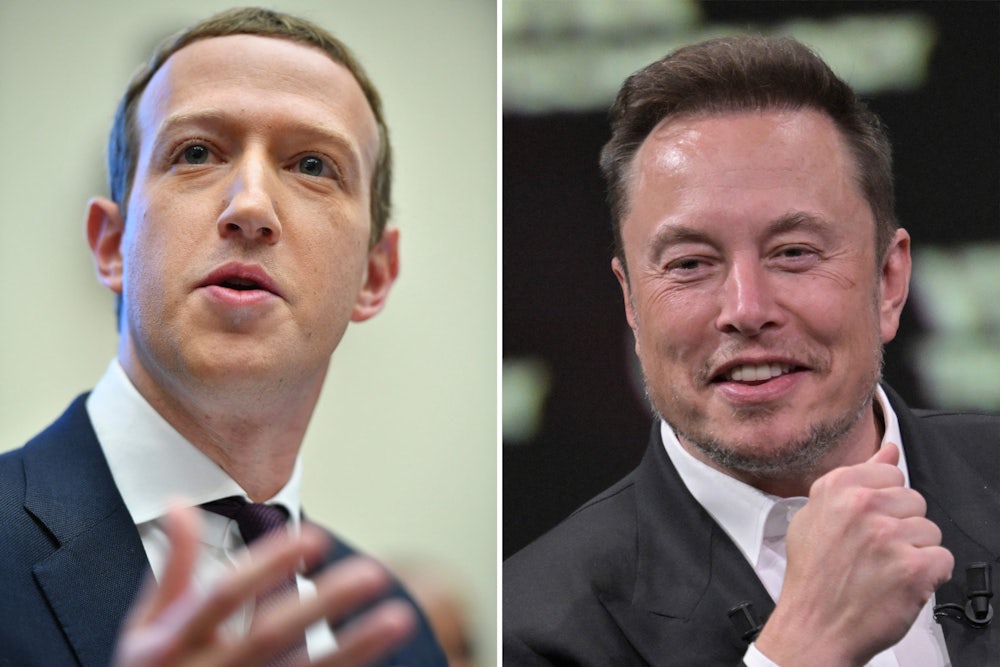In the days since Mark Zuckerberg’s Threads app premiered, a number of rather predictable media storylines and narratives have dominated the news cycles around the latest would-be Twitter replacement. One focuses on the sheer power of Zuckerberg’s Meta empire—Threads is now the fastest-growing app in history. Zuckerberg says his new platform hit 100 million sign-ups in less than a week. Of course, many of those users were already on other Zuckerberg digital properties: Facebook, Instagram, or WhatsApp.
A related narrative argues that this early but apparent success is a much-needed win for Zuckerberg, who squandered billions trying to convince people to join his online cartoon world, the metaverse. There’s also a more esoteric storyline about how the success of Threads might affect Zuckerberg’s looming antitrust battles. And yet somehow, the most predictable narrative is the right’s immediate cries that Threads is censoring their “free speech.”
This argument unfolded along exhaustingly familiar lines with right-wing figures regurgitating the same clichés and grievances they invoke every time a social media platform doesn’t cater to their ideological whims. On the day after Threads went live, Marjorie Taylor Greene tweeted that “Threads will be the same Marxist style social media experience that Zuckerberg usually offers.” Less than a week after the app launched, one Fox News guest declared that the supposed censorship on Threads is “absolutely straight out of Orwell’s 1984.”
The most cited example of this supposed censorship—and the one MTG referenced in her tweet—was a warning that appeared for Threads users attempting to follow Donald Trump Jr. Apparently, if you tried to follow the former president’s son on Threads, a message popped up informing you that the account has “repeatedly posted false information.” This brief interlude into rationality concluded predictably. Trump Jr. posted screenshots and complained on Twitter. A Meta spokesperson rushed to assure him that the misinformation label was an error which was being removed.
Never mind that Donald Trump Jr. has repeatedly posted false information. It’s one of his rhetorical hallmarks. His Twitter account was banned in 2020 after he endorsed a conspiracy-minded doctor’s video claiming Hydroxychloroquine cures Covid-19. In 2019, he posted and then deleted a tweet questioning whether Kamala Harris was an “American Black.” On Instagram this year, he posted a meme nodding to the vile conspiracy theory that the attack on Paul Pelosi was actually a gay lovers’ quarrel. One study that analyzed tens of millions of Facebook interactions found that Donald Trump Jr. was one of the main “superspreaders” of election misinformation on Zuckerberg’s flagship property.
And yet it was utterly unsurprising that Meta scrambled to assure Trump the younger that he can still spread all the misinformation he wants on the company’s new platform without consequences. For years, Zuckerberg and his enterprises have bent over backward to placate conservatives and court right-wing audiences. In the run-up to the 2020 election, he held face-to-face meetings with conservative heavyweights like Ben Shapiro, Tucker Carlson, and Lindsey Graham. He rarely grants media interviews but last year he appeared on Joe Rogan’s podcast—one of the few media empires that enjoys a young, right-wing audience. The top publishers on Facebook are consistently right-wing figures and outlets like Shapiro, The Daily Caller, and Dan Bongino. Donald Trump has repeatedly said that Zuckerberg “used to come to the White House and kiss my ass.”
But none of Zuckerberg’s attempts to placate the right have ever actually worked. He may have won over the larger figures of the movement, people like Ben Shapiro—Shapiro’s Daily Wire’s coverage of Zuckerberg has been noticeably positive as of late—but the typical Republican voter is more likely to sound more like Marjorie Taylor Greene, accusing Zuckerberg of buzzword evils like peddling “Marxist style social media experiences.”
It’s hard to imagine how a social media experience might be legitimately characterized as “Marxist” but valid characterizations went out the window when outrage became the Republican base’s driving force. In fact, one reason Zuckerberg’s own algorithms tend to amplify right-wing content is that outrageous buzzwords drive engagement. When asked why right-wing content has such an advantage on Facebook, one executive told Politico, “People respond to engaging emotion much more than they do to, you know, dry coverage.”
Algorithms rewarding posts that engage with users’ emotions may be a marvelous idea when feeds are stacked with videos of dogs skidding across linoleum kitchen floors. But that same process is deleterious when it comes to news (and “news”) in our current political environment. Things go off the rails when the algorithm encourages emotional engagement in the political sphere—people reach for absurd emotional tricks like accusing their political opponents of pedophilia. And when users share avalanches of emotionally charged election fraud misinformation on Facebook, the more motivated among them might do things like storm the U.S. Capitol in an attempt to overthrow American democracy.
But outrage for the sake of outrage itself is still the most powerful weapon for the exact sort of right-wing figures rushing to accuse Threads of censoring their “free speech.” Chaya Raichik, who runs the anti-LGBT account LibsOfTikTok, accused Zuckerberg of censorship after Threads removed her post saying that “non-binary isn’t real.” Again, a Meta spokesperson assured Fox Business that Raichik’s bigoted post is still live on Threads. But of course posting “non-binary isn’t real” is designed to spark emotional outrage. It’s hateful bumper sticker rhetoric and feels suspiciously like a post that was aimed to run afoul of Threads’ content moderation.
Raichik is one of a number of previously fringe-right Twitter figures who have become cozy with Elon Musk since the billionaire took over that social media platform and showed an almost impressive determination to run it into the ground. Spam accounts and misinformation are now so commonplace on Twitter that the site is basically unusable. But to the right-wing user, Elon Musk is a free speech “absolutist,” as he puts it (because, according to this right-wing ideology, private companies—not just the government—are subject to the First Amendment). And yet that characterization of Musk sinks under cursory examination: His iteration of Twitter has removed content critical of autocrats like Tayyip Erdoğan in Turkey and Narendra Modi in India at the behest of those governments.
The promise of Elon’s Twitter is not free speech. It was never actually about free speech—it’s more about the demands of a small group of always-online right-wingers who have baked their brains on the political internet. Rather than express legitimate concerns, they champion bad-faith absurdities like the Constitutional Right to post Hunter Biden’s dick pics on Twitter. They believe that their right to tweet transphobia is worth dying for. And they leveled these misplaced accusations of “censorship” so loudly for so long that somebody rich and jaded enough finally came along and gave them everything they wanted. But unsurprisingly, Musk’s decision to refashion Twitter into an experience that’s only enjoyable to this small group has turned off most of the site’s users. That’s why Zuckerberg pitched Threads as “a friendly public space for conversation.”
A “friendly” social media site is an oxymoron but it’s a common promise for new apps in the era of Musk’s off-the-rails Twitter. Keeping Threads “friendly” is not only “possible,” Zuckerberg claims, “it will ultimately be the key to its success.” The billionaire added: “That’s one reason Twitter never succeeded as much as I think it should have, and we want to do it differently.”
Zuckerberg and Meta did not launch Threads in order to make the internet a friendlier place. They did it because Zuckerberg wants to own everything he can. He tried to buy Twitter repeatedly in the late-aughts, when the site was still full of promise. But Threads’ success will at least partially hinge on people looking for a Twitter replacement that’s pleasant if you’re not an always-online right-winger.
Zuckerberg has not yet opened up Threads to advertisers but, eventually, he will. And they will flock there even faster than they fled Twitter. They will make both those decisions because what the right calls “censorship” is just good business for a social media company. Dogs skidding across linoleum kitchen floors are good for business. Pseudoscientific rants about how the coronavirus vaccine causes people to turn into human magnets are not good for business. Already, Threads seems to be discouraging all contentious topics—MSNBC host Mehdi Hasan said that Threads removed a video he posted simply because it referenced and then debunked anti-vax conspiracies.
Not that any of this should matter to the right-wingers who are crying censorship, again. There are four microblogging platforms—Gettr, Gab, Truth Social, and Parler—where they are free to post all the anti-vax and election fraud content they want. But the problem with those apps is that they don’t moderate their content and this is an ideology that survives upon its own infinite outrage cycle.
They believe their battle of ideas is legitimized when they run afoul of basic content moderation policies. And so they will keep pushing the line, hoping to cross it so that they can whine about “censorship” and “Marxist social media experiences.”
And nothing that Mark Zuckerberg ever does will ever be good enough. As long as there are mainstream social media platforms, there will be a group of people who claim they are being censored on them—it’s good for their business. Right-wing accusations of censorship are now as much a part of the internet as videos of dogs sliding across linoleum kitchen floors.










